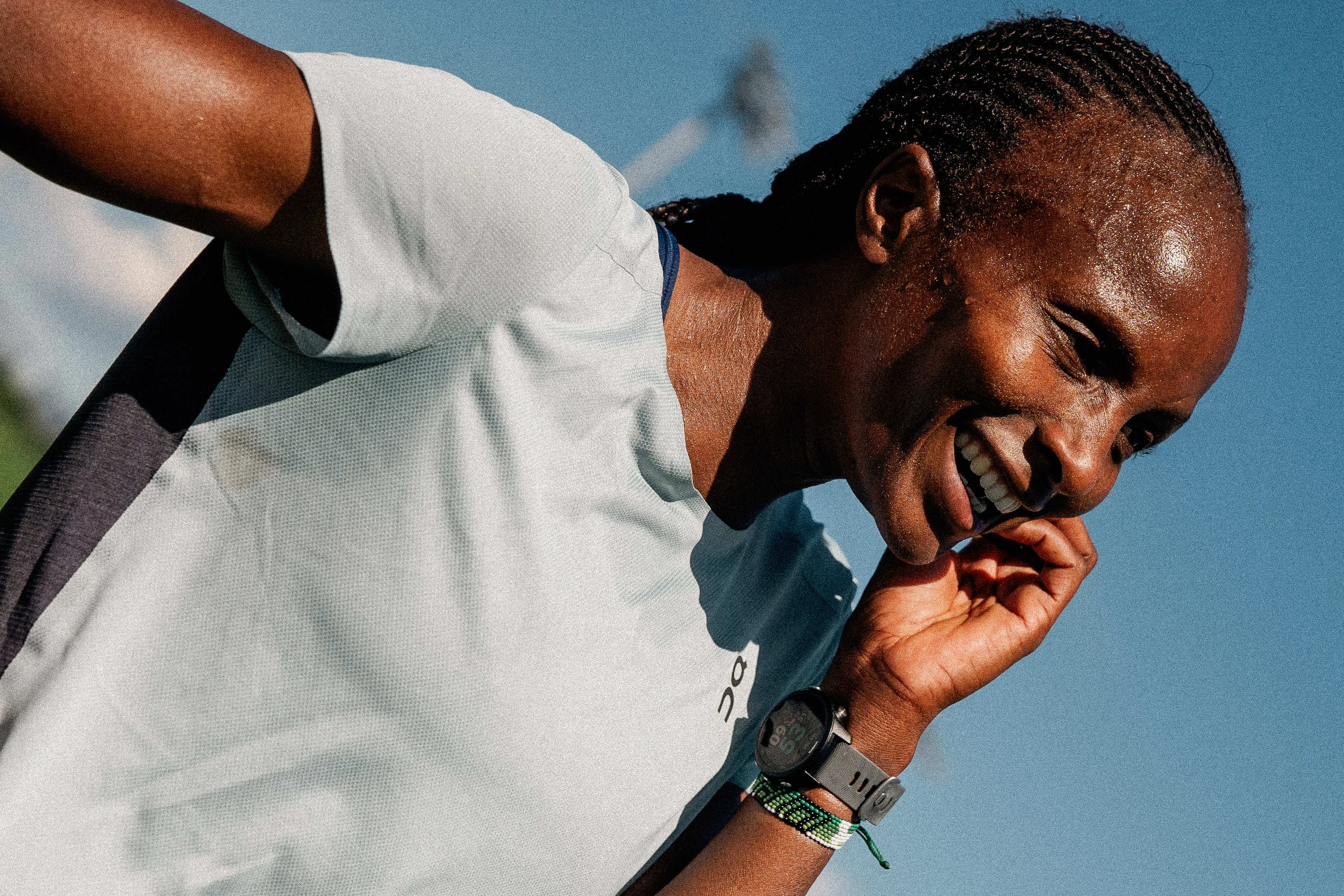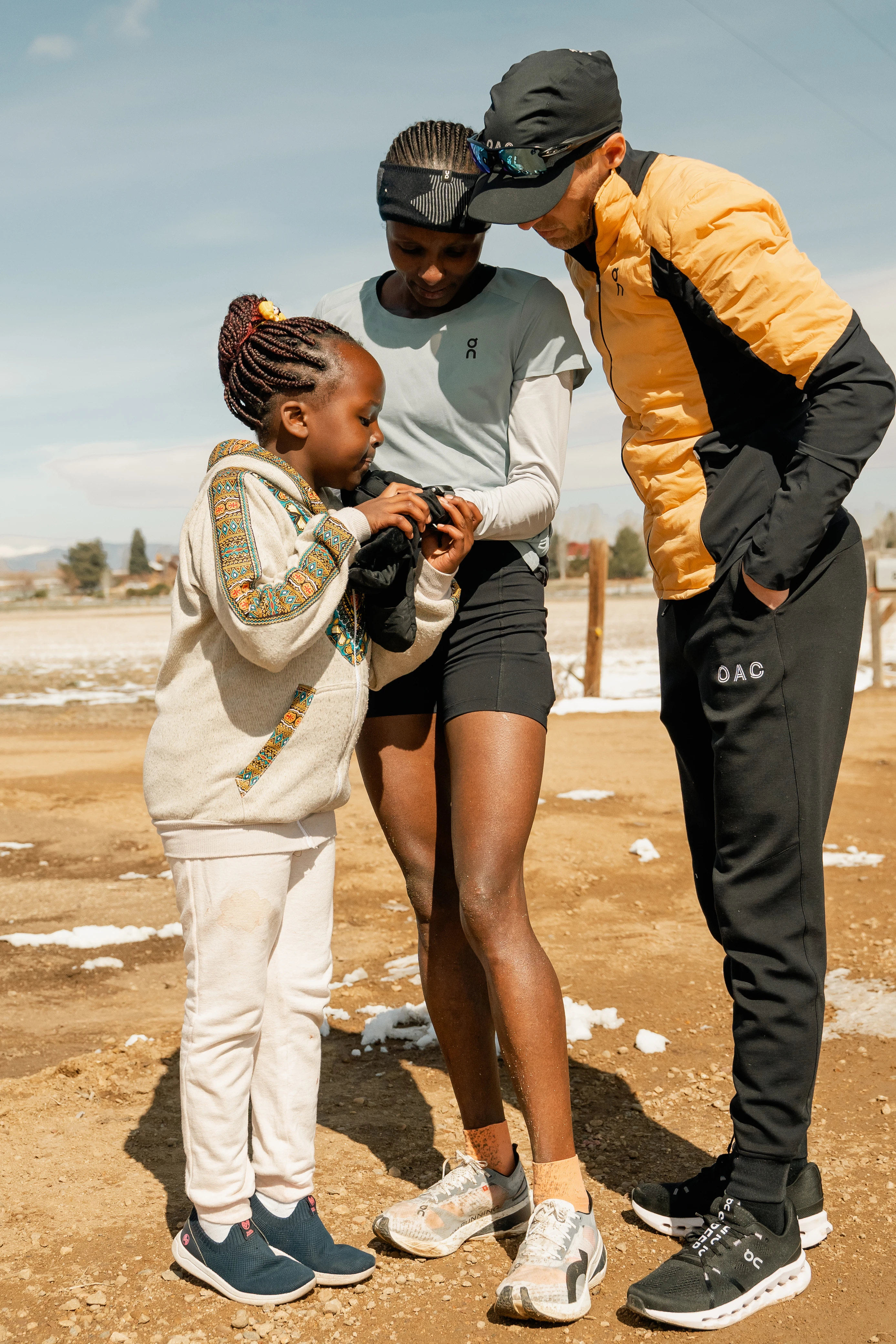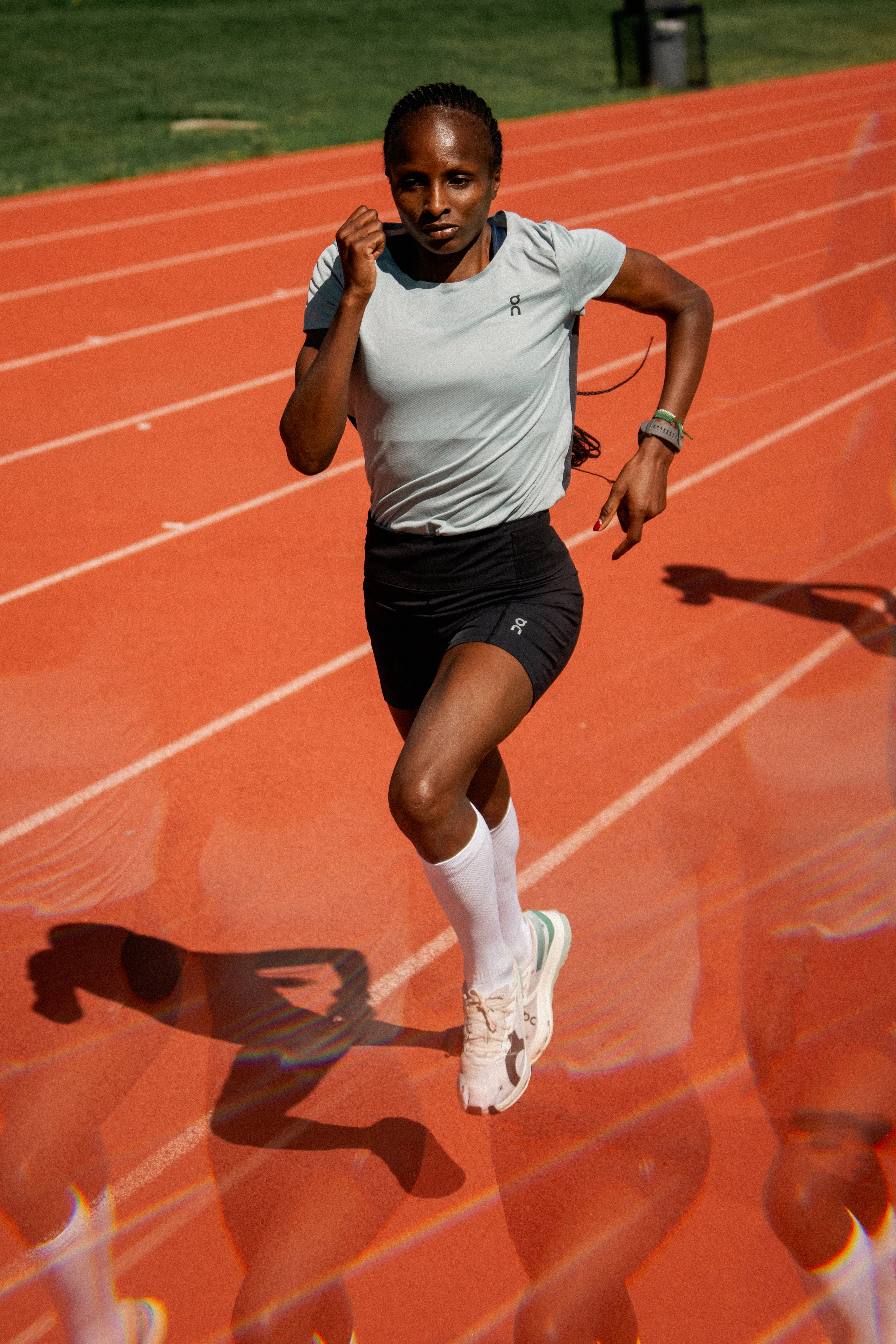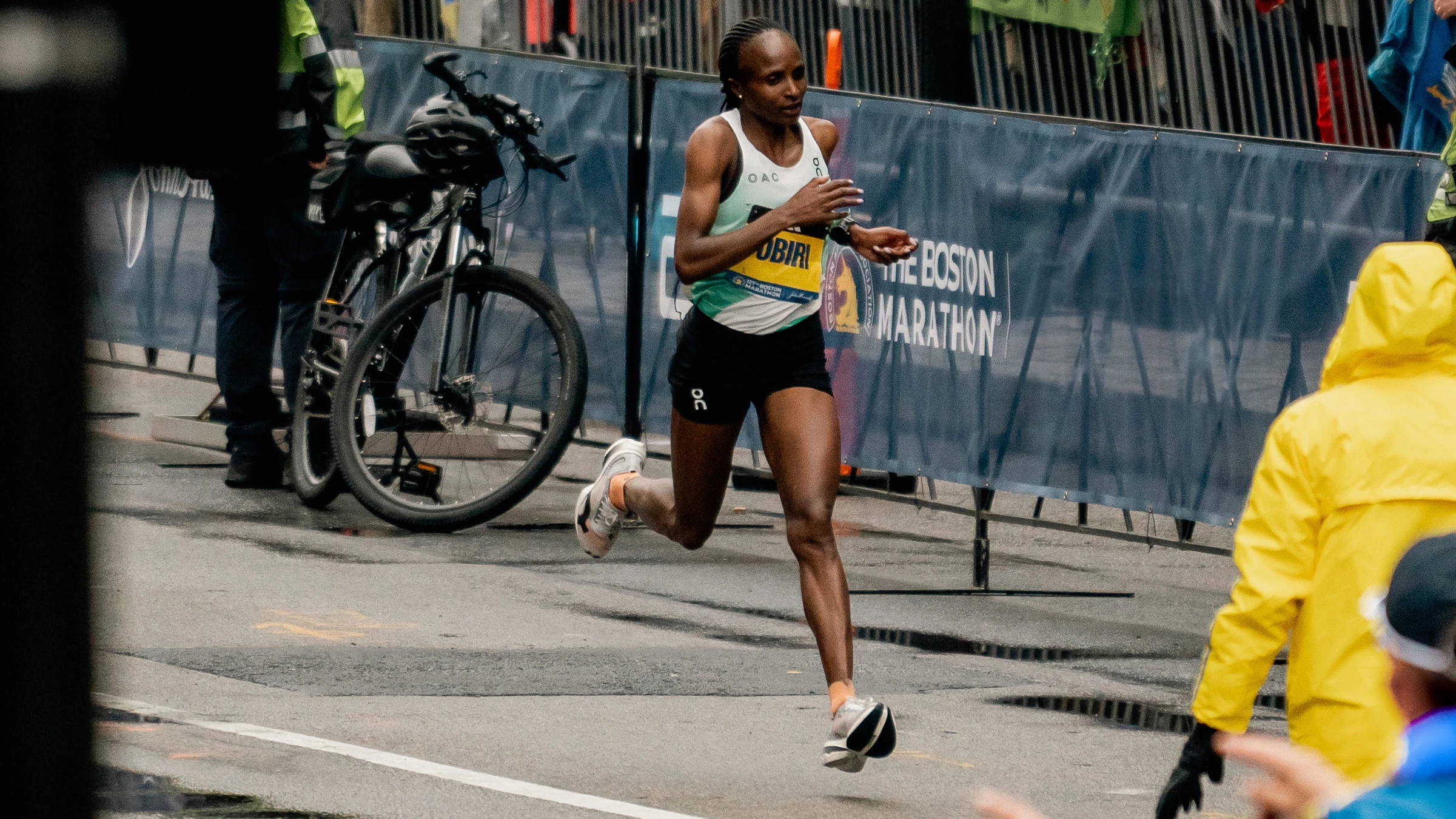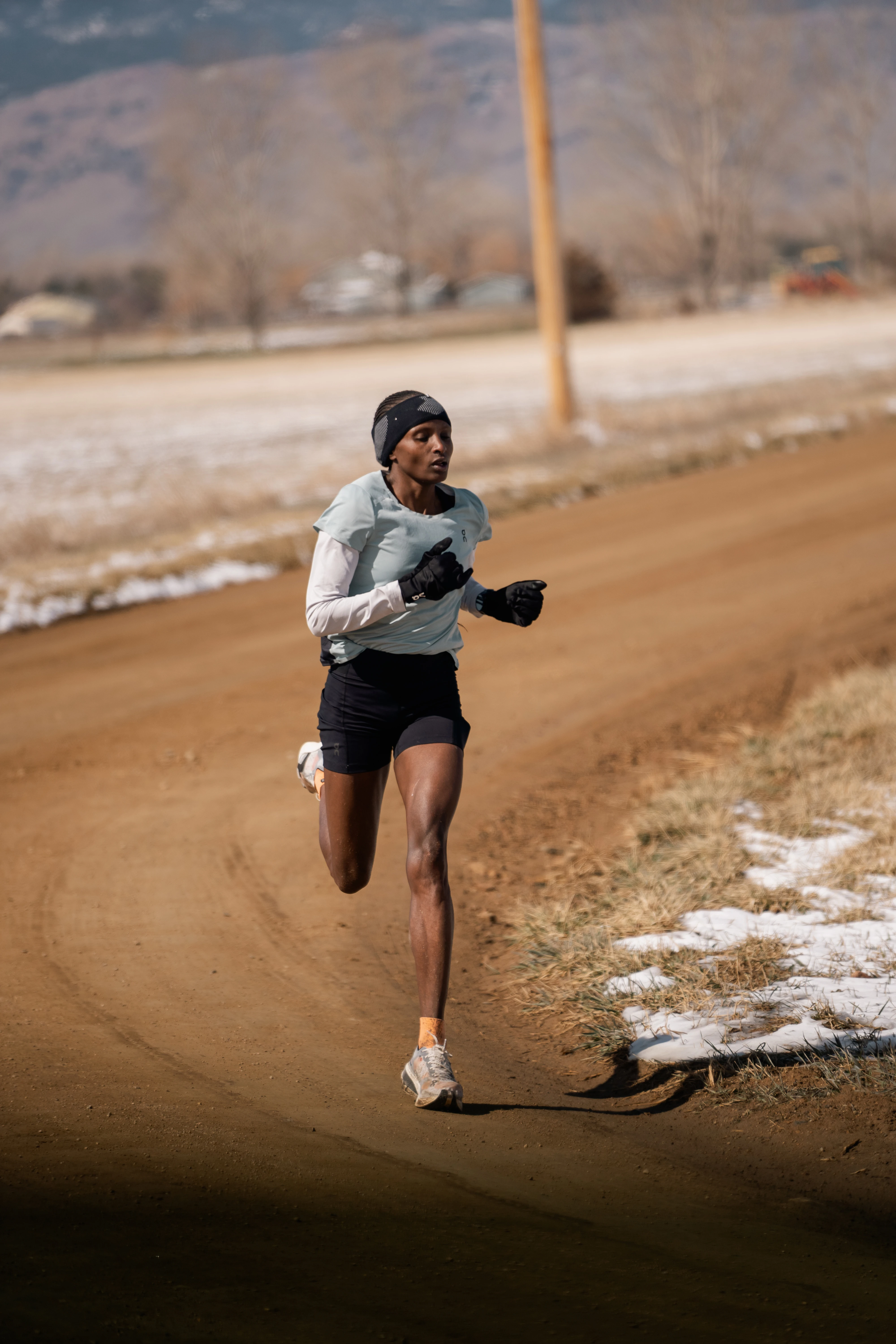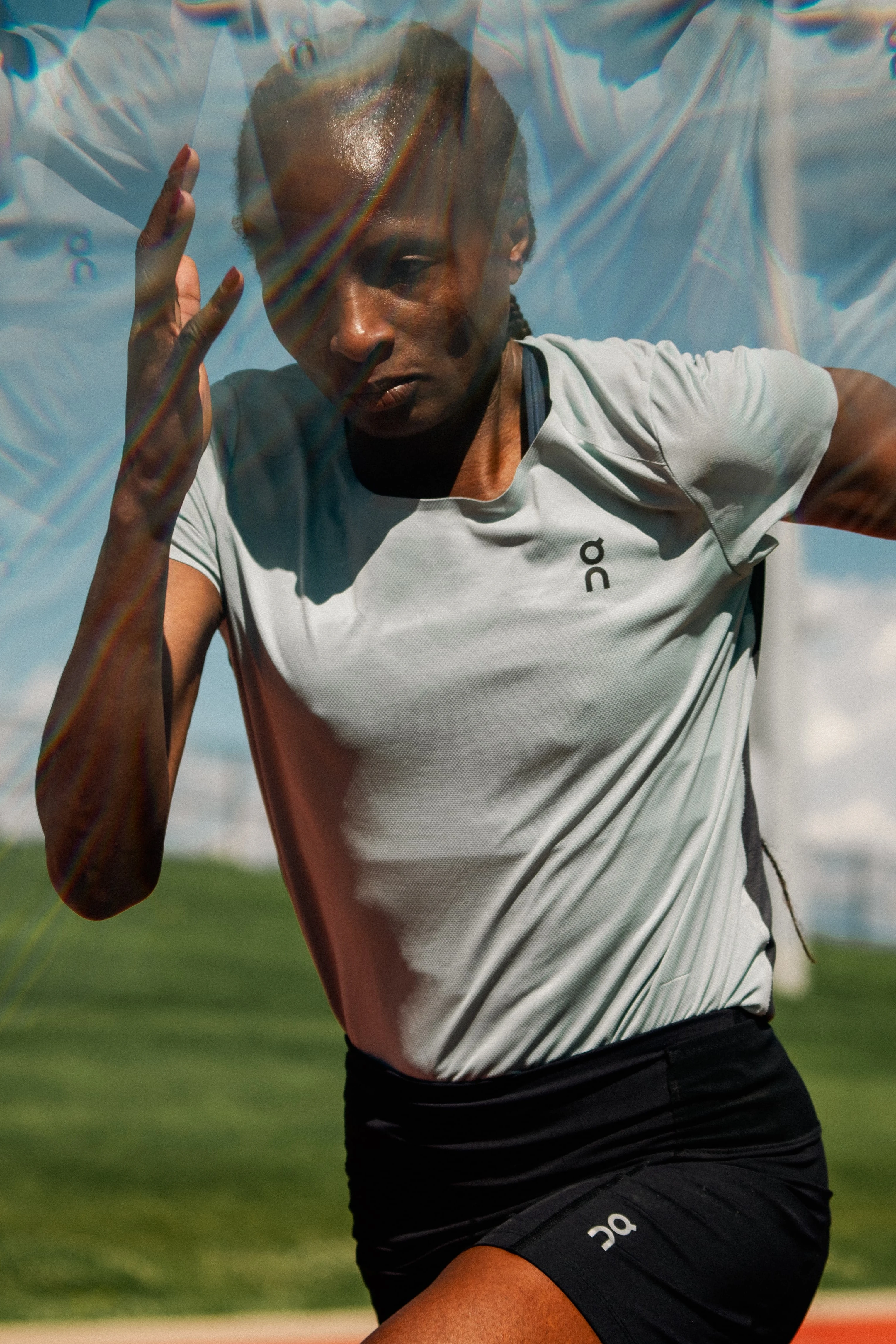Dear Echo: Hellen Obiri
Kenyan track star, Hellen Obiri, is running her third marathon just one year after segueing into the distance. Her goal: To take gold in one of the world’s most iconic races.
Words by Sarah Gearhart. Photography by Colin Wong.
Hellen Obiri went on to win the women's division at the 2023 Marathon in New York City on Sunday 5 November 2023 in two hours, 27 minutes and 23 seconds.
Eyes of a Champion
Hellen Obiri’s curiosity continues to lead her in bold directions. On the global running stage, no direction is more fearless than attempting to surmount the marathon. But the Kenyan track star isn't in it simply to finish. She wants to win as many times as she has the opportunity to be on the starting line.
When Hellen Obiri runs, she appears uniformly cadent and tireless. Her body knows what to do, pumping her legs and lungs with a combination of speed and endurance that few can match. It’s what has propelled her to the top of the podium throughout her track career as one of the sport’s most dominant runners.
In a new chapter of her athletic career, last fall, Obiri transitioned to the marathon, an ambition she’s had since 2011. Obiri’s gifted athleticism has fast-tracked her to the upper echelon of elite women. In only her second attempt at competing in the distance, she won this year’s Boston Marathon, the world’s oldest annual marathon and one of the most prestigious distance races on the calendar. Obiri is, simply put, a Grade A athlete – the highest caliber.
Now, she has turned her attention to preparing for the Marathon in New York City, taking place on November 5, 2023. One cold, sunny Thursday at 8 a.m. in October, four weeks ahead of the race, Obiri holds a concentrated gaze, as her feet propel from the surface of the Niwot High School track in the suburbs of Boulder, Colorado.
Before arriving on the track, Obiri started the day alongside her eight-year-old daughter Tania, whom she says is her daily motivation. This speed workout, one of two training sessions today, involves 200-meter repeats at 33 seconds each, followed by 1,600 meters five times at a pace of roughly five minutes and 13 seconds. That’s the goal at least. Obiri likes running fast, often quicker than her prescribed training paces. Including her warm up and cool down, the workout – coming a day after she ran 12 miles (around 19 kilometers) as a recovery run – is the equivalent of a half-marathon.
Obiri’s breath is visible in the 46-degree Fahrenheit (8 Celsius) air as she charges along the track with a powerful, wide stride. Obiri has already been up for two hours. In fact, most days of the week, she’s awake as early as 5:30 a.m., after sleeping for nine hours to recover from intense training sessions like this as well as long runs, often exceeding 21 miles (34 kilometers).
To excel in the marathon, a distance of 26.2 miles (42.2 kilometers), requires a heavy load on her body. “It’s a big, big difference,” Obiri says, referring to marathon training versus track. She used to tally less than 80 miles (130 kilometers) a week as a track athlete, but these days, she routinely logs upwards of 124 miles (200 kilometers) across seven days in addition to strength training. She doesn’t think twice about the workload. “If you want to be a good athlete,” Obiri says, “discipline is the key.”
“If you want to be a good athlete, discipline is the key.”
This is just what it takes, she says, to prepare for New York, the world’s largest marathon that attracts one of the most competitive fields in the sport. The hilly route starts in Staten Island and courses through all five boroughs of the city. It is the kind of racing experience that humbles the body, Obiri says. She learned this last November when she made her marathon debut in the race. It didn’t exactly go as planned. It was unseasonably warm. Obiri had yet to refine her hydration and fueling strategy, and skipped a key fluid station late into the race. Though she finished sixth overall, with a time of 2:25:49, Obiri was carted away in a wheelchair.
“I’ve learned from my mistakes,” Obiri says, recalling her initiation into competitive marathoning. Hydrate early and often, and avoid leading the pack, she points out.
Nearly one year after that experience, Obiri is prepared to show up on the starting line more polished. She enters the elite field as the reigning Marathon champion in Boston and a woman who better understands the art of patience that the distance necessitates. Despite all of her success on track, Obiri believes the marathon is her calling.
“I’ve learned from my mistakes.”
Last September, just seven weeks before her marathon debut in New York, Obiri moved to Boulder, Colorado, to train under the calculated guidance of Dathan Ritzenhein, a former professional runner who retired in 2020 as the fourth-fastest marathoner in U.S. history. Ritzenhein took the reins as Head Coach of the On Athletics Club (OAC), a Boulder-based training group of professional distance runners, all of whom are sponsored by On.
“Opportunity,” Obiri says in a soft-spoken voice when asked why she moved across the world to continue her running career alongside her husband Tom Nyaundi and their daughter. “Facilities, training shoes, a gym, coaches, a support team.” This standard of living in Colorado was a desirable change Obiri viewed as necessary while she chases lofty goals. These include eventually running all six World Marathon Majors races, a series of the largest and most renowned marathons in the world: Tokyo, Boston, London, Berlin, Chicago and New York.
Obiri also speaks of another vision in the not so distant future: to win an Olympic gold medal. She wants to attempt to earn one in the marathon at the 2024 Paris Games. But first, she must be selected for Kenya’s Olympic team. Her performance in New York will have an impact. And after Boston in April, Obiri has proved she can contend with the world’s best in one of the sport’s toughest and most physically demanding events.
So she is here, 5,400 feet (1,645 meters) above sea level in Boulder and thousands of miles from her home on the outskirts of Nairobi, Kenya, quietly working to become a better, stronger version of herself. Obiri says living in America is a stepping stone to somewhere greater.
Obiri, though, has already experienced greatness. She has numerous accolades attached to her name: world cross country champion, world indoor champion (3,000 meters), five-time national champion, three Olympic appearances complemented with two silver medals in the 5,000 meters. And yet Obiri, now 33, wants to achieve more. The mind of this champion does not rest. Instead, she remains curious and ready to endure.
Obiri has been this way since she started running at age 13 where she grew up in Bogin Choncho, a village in southwestern Kenya. She uses the word “poor” when describing her upbringing as the fourth oldest of six siblings in her family. It wasn’t unusual for her to go to school barefoot and hungry, an eight-miles round trip. Her family lived in a mud hut on a small piece of land and sold bananas, tomatoes and other vegetables to get by. Obiri still remembers the strain on her back and tightness in her shoulders as she lugged several liters of water uphill from a nearby river daily so her siblings and parents could boil it to drink and cook with.
“If I had a soft life when I was young, I couldn’t be a runner,” Obiri says.
She understood early that hard work would be the route to success. It has shaped her character over the years. In her hometown, Obiri is an anomaly. “We don’t have so many athletes,” she says. “When I go home, even now, people ask why I am running. We don’t know anything about sports where I come from.”
Obiri is a member of the Kisii, an ethnic group known for its soapstone artisans and banana farmers. Unlike the Kalenjin people, reputed for consistently producing some of the most dominant and successful long distance runners in the world – Olympic marathon champion Eliud Kipchoge among them — historically, few world-class runners have hailed from Obiri’s tribe. Naftali Temu, who won Kenya’s first gold medal at the 1968 Olympics in Mexico City in the men’s 10,000 meters, is an exception. Obiri’s lack of mentorship growing up meant she had to lean on herself to move her talent forward.
“When I go home, even now, people ask why I am running. We don’t know anything about sports where I come from.”
Before becoming a professional athlete, Obiri aspired to serve as a soldier, and in 2008 she joined the Kenya Defence Forces. The opportunity enabled her to earn a living that helped support her family as well as save enough income to move to Ngong, just south of Nairobi, where she could train with other top athletes. And all along, Obiri kept a close eye on elite women she admired, like Olympic and world champion Vivian Cheruiyot, who continues to be one of her role models. Obiri admires Cheruiyot’s tenacity and ambition. That, too, is what Obiri hopes to inspire in other women and young girls around the world.
The way Obiri runs illustrates her self-confidence and ability to do so. As she makes her way around the track, feverishly pumping her arms, her breathing is inaudible as she follows a male pacer from Eritrea. Ritzenhein says that Obiri is much stronger and faster since her marathon debut in New York, and since winning in Boston. It has created what he describes as “an amazing dilemma”: finding pacers that can keep up with her during training.
“I tried to do a little bit, and I got hurt last year,” Ritzenhein says, laughing. “We found someone pretty reliable, a Kenyan guy. He’s good for about 70 percent of the workouts.” But then, Ritzenhein says, Obiri takes off, dropping those that can’t maintain her pace. “She’s an ultimate competitor,” Ritzenhein adds.
Obiri smiles widely at the mention of her nickname, the Kenyan Lioness. “I have a strong mind,” she says. “If somebody says you can’t, say ‘you can.’”
